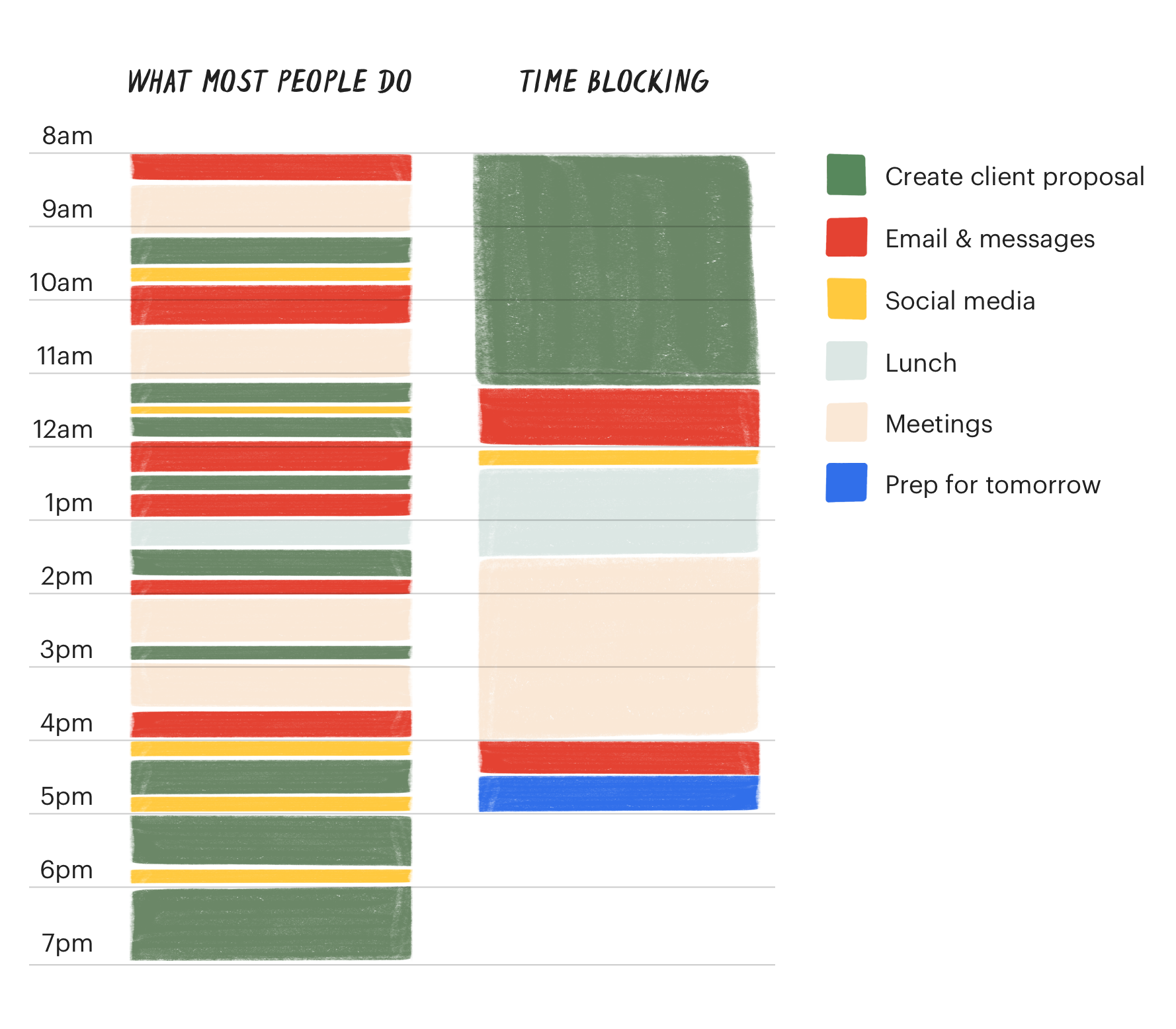Time blocking
it makes you twice as productive as those suckers who rely on lists.
—Cal Newport
A time management and task management method that assigns periods of time to work on tasks.
The method

- Open your planner. A calendar app can work, but paper is preferable so that you are not exposed to notifications or other distractions such as your email and Slack.
- Draw blocks for pre-existing commitments. A block has a start time, end time, and what it's for.
- Draw blocks for the things you want to work on
- Commit to the blocks you have drawn. Consider using a Tomato Timer or Time timer.
- If interruptions or delays occur, redraw your blocks. Another reason why paper is advantageous is that you can see these corrections. A digital calendar will not.
- At the end of the day, review tasks you didn't finish, and new tasks that came in.[1] Consider doing this as part of a larger end of work day ritual.
Why?
Scheduling can be a prison, but can also be a defensive wall against external thieves of your time.
Protect your time or it will be taken from you
- Humans are notoriously bad at guarding their time
- PPAI study shows only 33% of americans use a schedule
- If you do not master your own time, others will
- https://www.nirandfar.com/schedule-maker/
- Distractions are only distractions if there was something else you had traction on
https://www.wired.com/story/block-scheduling-calendar-workflow-productivity/
- Block in personal time
- 32% of knowledge workers in 2020 survey cited being unable to tune out of work
- Neil Pasricha recommends no-email policy between 10am-4pm
- Ask yourself honest questions
- can you work with vague day themes?
- do you work better with detailed directives?
- do you have time of day you are more productive?
- 4 common methods
- time blocking
- plan a specific goal/task around a time slot
- e.g. write for four hours each morning
- if task finishes early, move other blocks earlier
- plan a specific goal/task around a time slot
- task batching
- set time frame to handle specific tasks
- e.g. one hour for emails, 30 minutes for bill processing
- set time frame to handle specific tasks
- day theming
- dedicate day to one project
- Friday inspiration day
- Monday newsletter writing day
- Wednesday podcast day
- author leaves only monday to thursday open for calls
- similarly, Neil Pasricha recommends Untouchable Days, or Untouchable Hours
- Pasricha says day themeing and untouchable days results in increased creativity, better leading, spousing, parenting
- time boxing
- time blocking
- getting coworkers to respect your blocks is easy with Harmonizely or Calendly
- author and wife use joint block scheduling to share household chores, relieves stress on marriage
- apps
- tomato timer
Other's thoughts
David Sparks describes time blocking in multiple blog posts. Sam Julien says he uses this
Cal Newport made an unlisted 10m video
Todoist article, with no ads!
- differentiates time blocking, time boxing, task batching
- Differentiates shallow work like scrums, Slack messaging, email checking
Time blocking with Obsidian
https://www.reddit.com/r/ObsidianMD/comments/ofwcc3/timeblocking_a_personal_productivity_system_in/
"At the end of every workday, review any tasks you didn’t finish — as well as any new tasks that have come in — and adjust your time blocks for the rest of the week accordingly." The Complete Guide to Time Blocking ↩︎